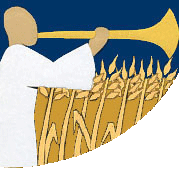 |

|

|
Heiligen der Laatste Dagen worden "Heiligen" genoemd omdat
ze zijn aangesteld en toegewijd om God te dienen door de verbonden gesloten
ten tijde van de doop en in de tempel. Toewijding is een verplichting
God lief te hebben en te dienen, en daardoor onze naaste lief te hebben
en te dienen, met geheel ons hart, macht en verstand, en met alle tijd
die ons is toegemeten (Mosiah 2:17; LV 4:2; Mattheus
22:37-39). Tienden en andere gaven zijn zowel een teken als een
tastbare uitdrukking van onze belofte om God "alles te geven wat
gij hebt en zijt" (Mosiah 2:34). Het
dragen van bepaalde verbondskleding wil ons herinneren aan de verbonden
die we sloten, en aan het werk waartoe we werden geordend. Op soortgelijke
wijze herinnert het naleven van het Woord van Wijsheid ons er aan dat
ons lichaam, zoals een tempel, gewijd is om Gods werk te verrichten (1
Korinthiers 3:16).
Heiligen der Laatste dagen gaven traditioneel gestalte aan hun identiteit
als verbondsvolk door zich te vereenzelvigen met Israel, door de Bijbel
omschreven als zijnde toegewijd aan de dienst van God (Exodus
19:3-6; 1 Petrus 2:9-10). Door de Herstelling worden Heiligen der
Laatste Dagen opgeroepen hetzelfde werk te verrichten dat in de schriften
aan Israel werd opgedragen, d.w.z. het werk van de Messias: de hongerigen
te voeden, de gevangenen te bevrijden, weder op te bouwen en te herstellen
om vanuit een vervallen staat door bediening alle geslachten en naties
tot zegen te zijn (2 Nephi 21:7-10; Abraham 2:9-11).
Tegenwoordig geloven minder Heiligen dan vroeger het geval was dat zij
letterlijk van Israel afstammen. Niettemin symboliseeert de gebruikelijke
afstammingsverklaring in patriarchale zegens voor hen nog steeds hun deelgenootschap
aan de messiaanse zendingsopdracht van Israel.
| Abraham O. Woodruff:
May God grant that we may be true and faithful in keeping His commandments,
and that we may feel to dedicate our lives and all we possess, realizing
that He is the giver of all, to the building up of His kingdom and
to the benefitting of our fellow men. We should not wish to live selfish
lives. Let us not live for ourselves alone, but live for our fellow
beings, and try to spread this gospel of peace on earth and goodwill
to all . . . |
| Collected Discourses
(Burbank, CA and Woodland Hills, UT: B.H.S. Publishing, 1987-1992) |
David O. McKay: The
true way to serve God is through service to man. This is the highest
ideal of religion ever given. It is the antithesis of pure nature.
Nature's law is the survival of the fittest. God's law is, use your
personal power and possessions for the advancement and happiness
of others. Jesus saw clearly that before the kingdom of God could
be realized, men must give up their cynical indifference and unbelief
and become reconciled to God and to one another. Jesus, in short,
marked out a new way of life for . . . all humanity—the way
of genuine love.
|
| Home Memories of President
David O. McKay, (Salt Lake City: Deseret Book, 1956), 236 |
Stephen R. Covey:
By consecration I mean seeking for God's glory, the attitude of
"how can I best serve?" Consecrated people have given
or dedicated all they have or ever will have to the Lord's purposes.
They look on their time, talents, and possessions as stewardships—ones
for which they are to give an honest accounting from time to time.
Nothing is their own, in this sense. Everything is the Lord's .
. .
|
| Spiritual Roots of Human
Relations (Salt Lake City: Deseret Book, 1970), 27-28 |
Lowell L. Bennion:
Latter-day Saints call themselves modern Israel. Patriarchal blessings
declare them to be descendants of Joseph through Ephraim and Manasseh.
We are also a covenant people, called to fulfill the mission [of]
ancient Israel . . . God needs a people who will lead the rest of
humankind to faith in God and his righteousness as taught by the
Hebrew prophets and Jesus.
|
| The Unknown Testament
(Salt Lake City: Deseret Book, 1988), 143 |
Hugh Nibley: Consecration
is the whole of the covenant of Israel. The chosen people themselves
are consecrated, qadosh meaning "cut off, set apart,"
the same meaning as saints—sanc-ti, sancti-fied (cf. sanctum,
"a place set apart"). They are called sigillim,
which is translated "peculiar" in our King James Bible,
but which means "sealed, reserved." What is con-secrated
is then made sacred, withdrawn from the ordinary economy, dedicated
to a particular purpose and to that purpose only.
|
| Approaching Zion
(Salt Lake City & Provo: Deseret Book & FARMS, 1989), 388-89 |
|

|
 |
